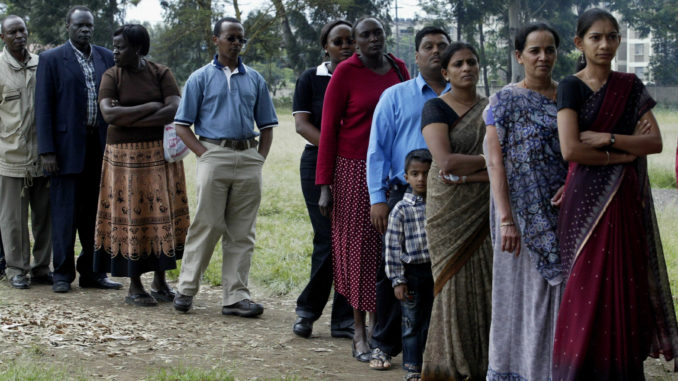
Kenyan Asians waiting to cast their vote Dec 2007
Introduction
When Alok Bhalla suggested that The Beacon undertake a series on Asians in east Africa it didn’t at first glance seem relevant to the times of hatreds and violence global in its tenor and scope, a time of cataclysmic climate change and contestations about citizenship that render so many displaced and homeless close to our shores and within our borders. Besides, the anxieties of the diaspora Indians were and are focused on, those in Europe and the USA, the developed world in which Indians yearn to find a promised land and at the same time retain their memories and identities overshadowed all else. Yet the diaspora of an earlier age and time holds invaluable lessons for our contemporary times, attesting to both what Mohsin Hamid called the inherent urge of humankind to migrate and, contrary to V.S.Naipaul’s blinkered and prejudiced eye, the capacity of the migrant to find the words that give expression to his/her experience of that displacement and resettlement. For in The Enigma of Arrival, Naipaul says bitingly, perhaps despairingly, ““How could people like these, without words to put to their emotions and passions, manage? They could, at best, only suffer dumbly. Their pains and humiliations would work themselves out in their characters alone: like evil spirits possessing a body, so that the body itself might appear innocent of what it did.”
The south Asians in east Africa did find the words that helped them articulate their belonging-ness in an ancient land they had come to and largely begun to look upon as their own; assimilating as only south Asians can and do, with their multicultural diversities, thus redefining the very idea of assimilation so beloved of western politicians and racists who would wish migrants to assimilate, which, as M.G.Vissanji pointed out in an earlier conversation in The Beacon means the erasure of memories, identities and histories of the migrant.
Indeed in the essays and extracts that The Beacon presents, the idea of assimilation itself is contested an debated by the migrants. In his essay, Vassanji lays out the dilemmas of that process: on the one hand a multicultural complexity imported into the alien land and on the other, a desire to identify with the local. “East African Asian society was complex and contradictory as any truly multicultural society needs to be (and perhaps as only Indians can make it”
His essay chronicles personalities that shaped and worked with this dialectic in politics and most significantly in literature,bringing to light little known facts about the seminal role Rajat Neogy founder-editor of Transition magazine played inan awakening of the African literaray sensibilities, featuring such wrters as Wole Soyinka, Chinua Achebe. Peter Kimani’s prize winning novel Dance of the Jakaranda an extract of which is featured, fictionalizes this dialectic within the multiracial contestations of pre-1960s colonial Kenya with a Punjabi Muslim character who emerges as the father of the freedom struggle. As Sana Aiyar pointed out in her review of the novel in the American Historical Review (not featured here), the novel appeared a few months before the President of Kenya in 2017 declared south Asians as the 44th tribe of Kenya. In Joginder Paul’s two stories, racial divides and colonial-settler mindsets historicise the colony’s formation with the Indian trapped in the middle. Atamjit Singh’s play, The Red Prophet with a preface by novelist and man of letters Ngũgĩ wa Thiong’o on the other hand, pays tribute to Makhan Singh, a real-life migrant Punjabi who birthed Kenya’s freedom struggle with the slogan “Uhuru Sasa!” (Freedom Now!) and workers’ trade unions, The last three essays are personal remembrances, one in poetic form as Sukrita Paul Kumar yearns to belong to an enchantment long vanished, Neera Kapur-Dromson recalls her family’s favourite vegetable seller, Mama Mboga who was more than that, a family member almost, while the Kishore Saint and Prem Saint both, recall their experiences as teachers in settler-dominated east Africa.
The Beacon would like to thank Alok Bhalla for curating this series that opens up our eyes to the enigmas of arrival and longing, bringing to life personalities in various walks of life that shaped the destinies of east African life, even if momentarily.—Ashoak Upadhyay
***
In and Out of Africa. Enigmas of Arrival and Loss: Curated by Alok Bhalla
- MG Vassanji
- Peter Kimani
- Joginder Paul
- Atamjit Singh
- Sukrita Paul Kumar
- Neera Kapur-Dromson
- Kishore Saint/Prem Saint
*******

Leave a Reply